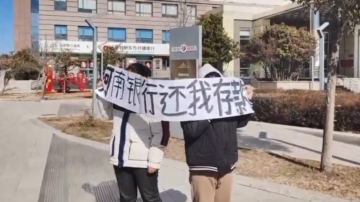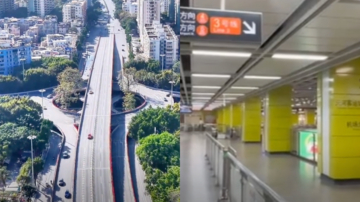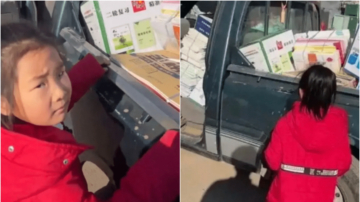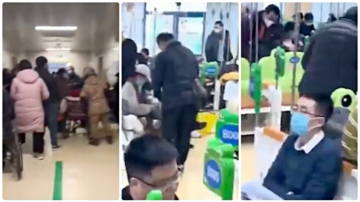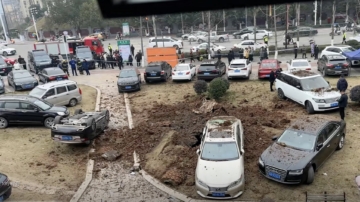【新唐人2013年07月08日訊】大陸一項官方數據顯示,中國的城鎮化率已經達到50%以上,但另有數據表明,有2億多的城鎮常住人口仍然是農村戶口,他們在就業、教育、醫療、住房、社會保障等各方面,與真正的城鎮戶籍居民相差甚遠。專家警告,這種大陸特有的「偽城鎮化」現象,將有可能導致社會矛盾加大,甚至發生嚴重衝突。
據中共媒體報導,7月5號,「大陸市長協會」發佈的2012年度《中國城市發展報告》顯示,截至去年年底,中國城鎮化率已達52.57%,顯示全中國超過一半的人口,居住在城鎮中。
但專家指出,這並不能說明更多的農業人口,已轉化成了非農業人口,因為他們的戶籍沒有改變。
河南農民工張小猛:「進城打工的都是暫住啊﹗沒有遷戶口的。有的需要的話辦個暫住證,有的暫住證都沒辦。」
一項由中國公安部統計的數據顯示,大陸城市戶籍人口不足35%,多達2億6千萬的城鎮常住人口是農村戶籍,他們依然無法享有和「城裡人」同等的社會福利待遇。
中國經貿研究會特約研究員鞏勝利:「中國的城鎮化比較嚴峻,農村人口進了城市,表明上他是在這個城市或者城鎮裡面在生存著,但是他沒有任何享受城鎮化人口的待遇,包括醫療、保險、就業、失業,還有住房、教育。所以中國面臨的問題就是人到了城鎮,但是人的身份可能還在鄉村。」
河南農民工張小猛:「城裡的甚麼低保、社保肯定沒有。5只要是農民身份的,福利待遇全部在農村。」
專家認為,中國大陸這種表面上人口轉移造成的高增長「城鎮化率」,並不能真實反映城鎮化水平,充其量可以稱其為「偽城鎮化」。
「中國經貿研究會」特約研究員鞏勝利,對目前大陸城鎮化前景表示擔憂。他指出,隨著越來越多農村人口湧入城市,戶籍制度造成的階級地位不平等將會日漸突出,並將導致一系列社會問題。
鞏勝利:「6中國今後的人口比例可能要達到10億城鎮化以上,就是還有3億以上的農村人口。現在麻煩比較大,很簡單,一句話,我是人,你是人,我們都是公民,但是我們公民的待遇不同。 比如說,中國最近幾年,從湖北、貴州有些城鎮發生了一些突發事件,就是這些人對政府處理農村的不滿,所以才激起了一些包括遊行示威﹗目前這樣的事情在中國非常的多。」
有評論還指出,伴隨大陸城鎮化而來的另外一個問題,就是農村土地所有權的問題。一旦農民的戶口性質發生了變化,原本擁有的土地就會失去,農民就會變得一文不名,從這個角度看,農村城市化的結果就是:農民被完全剝奪了財產,卻沒有享受到他們應得的待遇。
鞏勝利:「他把這些農民的地收了以後,納入到所謂的城鎮居民,但是這些人去了城鎮以後,怎麼樣生存下去,比如說,他有甚麼技能﹖你把他的地收了以後,他沒有地種了,讓他幹甚麼? 」
大部分城鎮戶口的居民在網上表示,在他們眼中,城市戶籍沒有任何價值,不能像公務員一樣買到低價的房產,也領取不到分文失業金,一樣被上學難、治病難、養老難、就業難、住房難這「五座大山」壓的喘不過氣,相比之下,他們更羨慕農村人又有房子又有地。但有農民反駁說,農民進城就是因為種地收益低的可憐,甚至難以度日,現在連房子都被強拆、土地被強佔。
網民哀嘆:同處在大陸社會最底層的人們,無論在城市還是農村,結果都是一樣的「被剝削」。
採訪編輯/張天宇 後製/葛雷
China's Fake Urbanization: Over 200 Million Remain Registered as “Rural Residents”
Recent official statistics show China's urban population
ratio has exceeded 50%.
However, among these urban residents, over 200 million
are still listed with rural status on their household registration (hukou).
Because of this, they don't get the same level of benefits
as urban residents with urban registration, such as
employment opportunities, education, healthcare,
housing and social security.
Experts warn that China's unique phenomenon of
“fake urbanization” may intensify current social conflicts and result in serious clashes.
According to Chinese Communist Party (CCP)
mouthpiece media,
the Chinese Mayor Association released on July 5th
it's annual report on China's urban development for 2012.
It says that by the end of 2012,
China's urban population ratio had reached 52.57%.
This shows that over half of China's population
now lives in cities and towns.
Some experts commented that the statistics don't show
clearly whether more of the farming population have
become part of the non-farming population,
as their household registration status has stayed listed as rural.
Zhang Xiaomeng, Henan peasant worker:
“Migrant workers are only temporary residents.
Our household registration status hasn't changed.
To work in city, we need to apply
for a temporary residency permit.
Some of us haven't even applied that permit yet.”
A survey by the CCP's Ministry of Public Security shows that
only less than 35% of Chinese have a household
registration of urban status.
As many as 260 million urban residents are still legally part
of “rural population” as their household registration status.
Therefore they can't share the same level of
social welfare as “real” urban people.
Gong Shengli, researcher at Chinese Seminar of
Economy and Trade: ”The situation of China's urbanization process is pretty bad.
When rural people go to work in cities, they only live their
lives there but can't enjoy any of the welfare of
real urbanized people in healthcare, insurance, employment
and unemployment benefits, housing and education.
So China's problem is that when people move to cities
their legal identification remains in the countryside.”
Zhang Xiaomeng, Henan peasant worker: ”There is definitely
no basic living allowance or social security benefit for us.
As long as your identification is that of a peasant,
all welfare is subject to those of rural levels.”
Some experts say China's rapid growth of urban
population from apparent migration cannot reflect the real level of urbanization.
At most it can only be called “fake urbanization”.
Gong Shengli, research fellow of Chinese Seminar
of Economy and Trade, says he worries about the future of China's urbanization.
Gong says that with more rural people flowing into cities,
inequalities due to the household registration system
will become more and more prominent,
and this will lead to a number of social problems.
Gong Shengli: “In the future China's urban population
may reach as many as one billion, with over 300 million people left in rural areas.
The current trouble is very simple but serious.
That is, both groups are humans and Chinese citizens,
yet one group gets treated so differently from the other.
For example, in the past several years some incidents
broke out in towns of Hubei and Guizhou.
The cause is exactly the grudge against the government
about how they treat rural people.
That's why people demonstrated and protested.
Currently incidents like this happen often in China.”
Some analysis also points out another problem accompanied
with China's urbanization process, which is the land ownership issue in rural areas.
Once a Chinese peasant changes his household registration
status, he will automatically lose his land, which is equivalent
to being deprived of one's most important property.
From this point of view, during the urbanization process
peasants will lose their property but may not be compensated with urban welfare,
a system which itself is also badly corrupted.
Gong Shengli: “Let's say that peasants hand in their land
and become so-called urban residents.
The problem is, how will they survive there?
For example, what skills do they have?
After you take their land, they will have no farming work to do.
What should they do in the future?”
On the other hand, many netizens of urban status claim that
in their opinions the urban status has no value at all, either.
They can't purchase houses at low prices like government
employees; they get zero unemployment compensation;
and they are also oppressed by the “five big mountains”,
which are difficulties in attending school, seeing a doctor,
caring aged, finding a job and getting a house.
In contrast, urban residents even envy country people
because at least they have house and land.
However, rural people answer back that they move into cities
exactly because they earn too little to make a living;
and now, their houses or lands can be forcibly
demolished or occupied.
Netizens lament that the people in China's lower class,
whether it's those in the city or the country,
have no difference in being exploited by the CCP authorities.
據中共媒體報導,7月5號,「大陸市長協會」發佈的2012年度《中國城市發展報告》顯示,截至去年年底,中國城鎮化率已達52.57%,顯示全中國超過一半的人口,居住在城鎮中。
但專家指出,這並不能說明更多的農業人口,已轉化成了非農業人口,因為他們的戶籍沒有改變。
河南農民工張小猛:「進城打工的都是暫住啊﹗沒有遷戶口的。有的需要的話辦個暫住證,有的暫住證都沒辦。」
一項由中國公安部統計的數據顯示,大陸城市戶籍人口不足35%,多達2億6千萬的城鎮常住人口是農村戶籍,他們依然無法享有和「城裡人」同等的社會福利待遇。
中國經貿研究會特約研究員鞏勝利:「中國的城鎮化比較嚴峻,農村人口進了城市,表明上他是在這個城市或者城鎮裡面在生存著,但是他沒有任何享受城鎮化人口的待遇,包括醫療、保險、就業、失業,還有住房、教育。所以中國面臨的問題就是人到了城鎮,但是人的身份可能還在鄉村。」
河南農民工張小猛:「城裡的甚麼低保、社保肯定沒有。5只要是農民身份的,福利待遇全部在農村。」
專家認為,中國大陸這種表面上人口轉移造成的高增長「城鎮化率」,並不能真實反映城鎮化水平,充其量可以稱其為「偽城鎮化」。
「中國經貿研究會」特約研究員鞏勝利,對目前大陸城鎮化前景表示擔憂。他指出,隨著越來越多農村人口湧入城市,戶籍制度造成的階級地位不平等將會日漸突出,並將導致一系列社會問題。
鞏勝利:「6中國今後的人口比例可能要達到10億城鎮化以上,就是還有3億以上的農村人口。現在麻煩比較大,很簡單,一句話,我是人,你是人,我們都是公民,但是我們公民的待遇不同。 比如說,中國最近幾年,從湖北、貴州有些城鎮發生了一些突發事件,就是這些人對政府處理農村的不滿,所以才激起了一些包括遊行示威﹗目前這樣的事情在中國非常的多。」
有評論還指出,伴隨大陸城鎮化而來的另外一個問題,就是農村土地所有權的問題。一旦農民的戶口性質發生了變化,原本擁有的土地就會失去,農民就會變得一文不名,從這個角度看,農村城市化的結果就是:農民被完全剝奪了財產,卻沒有享受到他們應得的待遇。
鞏勝利:「他把這些農民的地收了以後,納入到所謂的城鎮居民,但是這些人去了城鎮以後,怎麼樣生存下去,比如說,他有甚麼技能﹖你把他的地收了以後,他沒有地種了,讓他幹甚麼? 」
大部分城鎮戶口的居民在網上表示,在他們眼中,城市戶籍沒有任何價值,不能像公務員一樣買到低價的房產,也領取不到分文失業金,一樣被上學難、治病難、養老難、就業難、住房難這「五座大山」壓的喘不過氣,相比之下,他們更羨慕農村人又有房子又有地。但有農民反駁說,農民進城就是因為種地收益低的可憐,甚至難以度日,現在連房子都被強拆、土地被強佔。
網民哀嘆:同處在大陸社會最底層的人們,無論在城市還是農村,結果都是一樣的「被剝削」。
採訪編輯/張天宇 後製/葛雷
China's Fake Urbanization: Over 200 Million Remain Registered as “Rural Residents”
Recent official statistics show China's urban population
ratio has exceeded 50%.
However, among these urban residents, over 200 million
are still listed with rural status on their household registration (hukou).
Because of this, they don't get the same level of benefits
as urban residents with urban registration, such as
employment opportunities, education, healthcare,
housing and social security.
Experts warn that China's unique phenomenon of
“fake urbanization” may intensify current social conflicts and result in serious clashes.
According to Chinese Communist Party (CCP)
mouthpiece media,
the Chinese Mayor Association released on July 5th
it's annual report on China's urban development for 2012.
It says that by the end of 2012,
China's urban population ratio had reached 52.57%.
This shows that over half of China's population
now lives in cities and towns.
Some experts commented that the statistics don't show
clearly whether more of the farming population have
become part of the non-farming population,
as their household registration status has stayed listed as rural.
Zhang Xiaomeng, Henan peasant worker:
“Migrant workers are only temporary residents.
Our household registration status hasn't changed.
To work in city, we need to apply
for a temporary residency permit.
Some of us haven't even applied that permit yet.”
A survey by the CCP's Ministry of Public Security shows that
only less than 35% of Chinese have a household
registration of urban status.
As many as 260 million urban residents are still legally part
of “rural population” as their household registration status.
Therefore they can't share the same level of
social welfare as “real” urban people.
Gong Shengli, researcher at Chinese Seminar of
Economy and Trade: ”The situation of China's urbanization process is pretty bad.
When rural people go to work in cities, they only live their
lives there but can't enjoy any of the welfare of
real urbanized people in healthcare, insurance, employment
and unemployment benefits, housing and education.
So China's problem is that when people move to cities
their legal identification remains in the countryside.”
Zhang Xiaomeng, Henan peasant worker: ”There is definitely
no basic living allowance or social security benefit for us.
As long as your identification is that of a peasant,
all welfare is subject to those of rural levels.”
Some experts say China's rapid growth of urban
population from apparent migration cannot reflect the real level of urbanization.
At most it can only be called “fake urbanization”.
Gong Shengli, research fellow of Chinese Seminar
of Economy and Trade, says he worries about the future of China's urbanization.
Gong says that with more rural people flowing into cities,
inequalities due to the household registration system
will become more and more prominent,
and this will lead to a number of social problems.
Gong Shengli: “In the future China's urban population
may reach as many as one billion, with over 300 million people left in rural areas.
The current trouble is very simple but serious.
That is, both groups are humans and Chinese citizens,
yet one group gets treated so differently from the other.
For example, in the past several years some incidents
broke out in towns of Hubei and Guizhou.
The cause is exactly the grudge against the government
about how they treat rural people.
That's why people demonstrated and protested.
Currently incidents like this happen often in China.”
Some analysis also points out another problem accompanied
with China's urbanization process, which is the land ownership issue in rural areas.
Once a Chinese peasant changes his household registration
status, he will automatically lose his land, which is equivalent
to being deprived of one's most important property.
From this point of view, during the urbanization process
peasants will lose their property but may not be compensated with urban welfare,
a system which itself is also badly corrupted.
Gong Shengli: “Let's say that peasants hand in their land
and become so-called urban residents.
The problem is, how will they survive there?
For example, what skills do they have?
After you take their land, they will have no farming work to do.
What should they do in the future?”
On the other hand, many netizens of urban status claim that
in their opinions the urban status has no value at all, either.
They can't purchase houses at low prices like government
employees; they get zero unemployment compensation;
and they are also oppressed by the “five big mountains”,
which are difficulties in attending school, seeing a doctor,
caring aged, finding a job and getting a house.
In contrast, urban residents even envy country people
because at least they have house and land.
However, rural people answer back that they move into cities
exactly because they earn too little to make a living;
and now, their houses or lands can be forcibly
demolished or occupied.
Netizens lament that the people in China's lower class,
whether it's those in the city or the country,
have no difference in being exploited by the CCP authorities.

